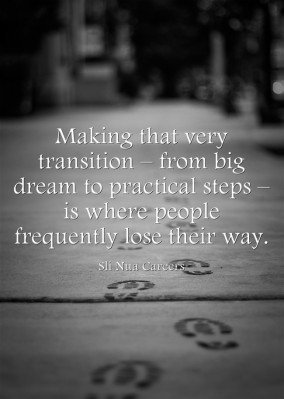By Liam Horan, Sli Nua Careers

When you resolve to change careers – as opposed to change jobs – you can feel a great surge of excitement. The realisation that you actually can change careers can be a huge liberation – “I don’t have to keep doing this for the rest of my days, wow.”
But unless you know exactly which new career path you are planning to follow, the next phase of the process can either be frustrating and perhaps even disappointing. Moving from the big dream to practical steps can be a come-down, but putting real shape on your thoughts and ideas is crucial, and requires significant input by you.
Making that very transition – from big dream to practical steps – is where people frequently lose their way. The six careers they have on their mind cease to be a source of excitement and become a burden – plus the motivation generated on New Year’s Eve starts to wither as January rolls on.

Here are some simple steps to help you make a start, make progress, and eventually make the transition:
How do I know what I’m good at?
How do I know what I will like?
If I make the wrong step now, will it only serve to heighten my current dissatisfaction and diminish my capacity to make a further change down the line?
Big decisions – like elephants you wish to eat – are best tackled in small bites. Being told to watch a YouTube video on the role of a HR specialist can be underwhelming for someone on the cusp of major change. You may be disappointed that your first action is to merely talk to someone working in a sector you are eyeing up.
But those small, practical steps are essential elements of exploring what will bring you career satisfaction. It’s real life, not Hollywood: the earth is unlikely to move (though, of course, you may ultimately decide that earth-moving is what you wish to do.)
Step by step, you should work your way through the careers you’re considering. Shadow somebody for half a day. Talk to someone in the sector. Read trade publications. Take a short course.
By ‘tasting’ in this way, you will get to the heart of the matter. You may realise you had rose-tinted views of some professions – and, equally, you may conclude that you didn’t know just how fulfilling certain other professions might be.
Career satisfaction comes when you find a job that suits your behavioural characteristics. Thus self-awareness is crucial – you need to know key things about yourself. Are you a front-of-house person, or someone who beavers away quietly in the corner? Do you like to have 100 customers a day, or one a month? Do you flourish when researching? How do you like to be managed? How do you like to manage people?
Psychometric testing – and follow-up work with career counsellors – can help you develop your self-awareness. But you can also develop it yourself by writing down words and phrases that describe you, and by getting friends to also summarise you with words and phrases.
In this way, you will move towards a greater understanding of yourself. You may realise that your current career dissatisfaction stems from the fact that you have been living a lie. You’ve been forcing yourself to do something that, ultimately, conflicts with your behavioural characteristics. Because humans are resilient, you may have done a very good job of forcing yourself to live that lie, but, long-term, your career happiness rests when you work in your best zone.
At Sli Nua Careers, we have a range of coaches with experience of helping individuals through the often rocky road of career change. Our other services include CV preparation, interview training, mock interview, LinkedIn profile writing and application form writing. Contct us here www.slinuacareers.com






